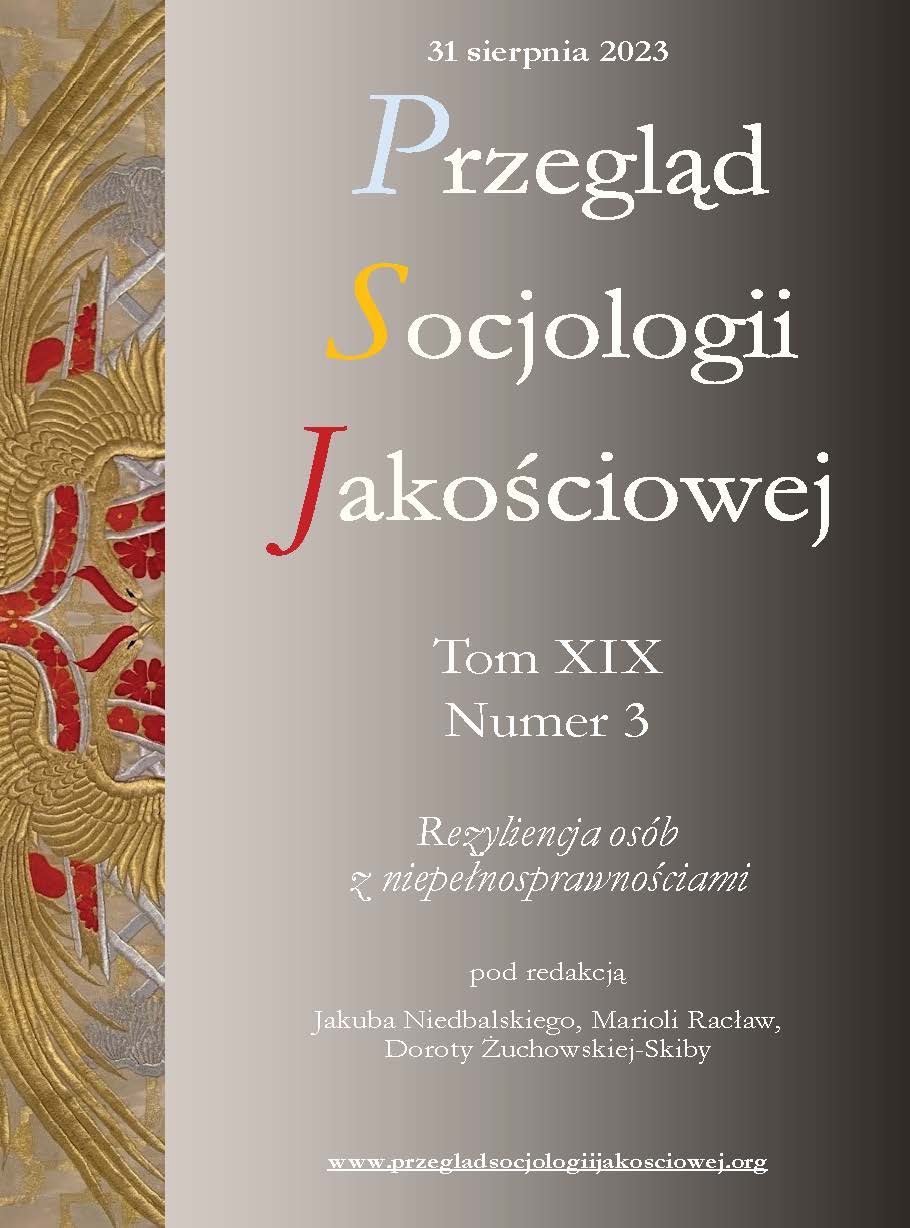Home Caregivers of Seniors with Dementia in the Pandemic Reality
DOI:
https://doi.org/10.18778/1733-8069.19.3.07Keywords:
caregivers, dementia, COVID-19Abstract
The pandemic has had a significant impact on the social reality, the current characteristics of which include: unpredictability, permanent change, and difficulties in defining actions to deal with the consequences of the existing threats, both at the macro and micro level.
This situation particularly affects groups that need social support. One of them includes home caregivers of people suffering from dementia. The aim of the article is to present the situation of home caregivers who take care of their family members suffering from dementia. The description is based on data obtained in random interviews carried out in 2021 on a sample selected in a purposeful manner. The respondents recognized that the pandemic had a significant impact on the way they function, in particular: the way they provide care (a feeling of greater burden due to limited institutional support and access to medical care), the need to function in virtual reality, an increase in the sense of exclusion, and the deterioration of mood resulting from both from personal experience and observation of the condition of the person under their care.
Downloads
References
Altieri Manuela, Santangelo Gabriella (2021), The psychological impact of COVID-19 pandemic and lockdown on caregivers of people with dementia, „American Journal of Geriatric Psychiatry”, vol. 29(1), s. 27–34.
Google Scholar
DOI: https://doi.org/10.1016/j.jagp.2020.10.009
Barczak Anna, Hintze Beata (2022), Early diagnosis of behavioral variant of frontotemporal dementia – a clinical perspective, „Neuropsychiatry and Neuropsychology”, vol. 17(1), s. 16–23.
Google Scholar
DOI: https://doi.org/10.5114/nan.2022.117952
Beck Ulrich (2002), Społeczeństwo ryzyka. W drodze do innej nowoczesności, Warszawa: Wydawnictwo Naukowe Scholar.
Google Scholar
Beck Ulrich (2012), Społeczeństwo światowego ryzyka, Warszawa: Wydawnictwo Naukowe Scholar.
Google Scholar
Bilikiewicz Adam, Parnowski Tadeusz (2009), Starzenie się i zaburzenia psychiczne wieku podeszłego, [w:] Adam Bilikiewicz (red.), Psychiatria, Warszawa: Wydawnictwo Lekarskie PZWL, s. 457–500.
Google Scholar
Carcavilla Nuria, Pozo Ana Sofia, González Belén, Moral-Cuesta Débora, Roldán José Joaquín, Erice Victoria, Ganzua Remírez Ana de (2021), Needs of Dementia Family Caregivers in Spain During the COVID-19 Pandemic, „Journal of Alzheimers Disease”, vol. 80(2), s. 533–537.
Google Scholar
DOI: https://doi.org/10.3233/JAD-201430
Cohen Gabriela, Russo Maria Julieta, Campos Jorge, Allegri Ricardo (2020), Living with dementia: increased level of caregiver stress in times of COVID-19, „International Psychogeriatric”, vol. (32)11, s. 1377–1381.
Google Scholar
DOI: https://doi.org/10.1017/S1041610220001593
Creswell John (2013), Projektowanie badań naukowych. Metody ilościowe, jakościowe i mieszane, Kraków: Wydawnictwo Uniwersytetu Jagiellońskiego.
Google Scholar
Długosz Piotr (2021), Trauma pandemii COVID-19 w Polskim społeczeństwie, Warszawa: Wydawnictwo CeDeWu.
Google Scholar
Drozdowski Rafał, Frąckowiak Maciej, Krajewski Maciej, Kubacka Małgorzata, Modrzyk Ariel, Rogowski Łukasz, Rura Przemysław, Stamm Agnieszka (2020), Życie codzienne w czasach pandemii. Raport z pierwszego etapu badań, Poznań: Wydawnictwo Uniwersytetu Adama Mickiewicza w Poznaniu.
Google Scholar
Durda Magdalena (2010), Organizacja opieki nad osobami z demencją w Polsce na tle krajów rozwiniętych i rozwijających się, „Gerontologia Polska”, t. 18(2), s. 76–85.
Google Scholar
Główny Urząd Statystyczny (2021), Wykorzystanie technologii informacyjno-komunikacyjnych w jednostkach administracji publicznej, przedsiębiorstwach i gospodarstwach domowych w 2020 roku, Warszawa.
Google Scholar
Hołyst Brunon (2002), Na granicy życia i śmierci. Studium kryminologiczne i wiktymologiczne, Warszawa: C.F. Muller Lex utilis.
Google Scholar
Huang Si-Sheng (2022), Depression among caregivers of patients with dementia: Associative factors and management approaches, „World Journal of Psychiatry”, vol. 12(1), s. 59–76.
Google Scholar
DOI: https://doi.org/10.5498/wjp.v12.i1.59
Iliffe Steve, Drennan Vari (2001), Primary Care and Dementia, London: Jessica Kingsley Publishers.
Google Scholar
Jarkiewicz Jadwiga, Kotapka-Minc Sławomira, Parnowski Tadeusz (2002), Opieka nad chorymi z chorobą Alzheimera w Polsce – ocena aktualnego stanu, [w:] Gaby Schwarz (red.), Choroba Alzheimera. Objawy, leczenie, opieka, pomoc, Warszawa: Wydawnictwo Lekarskie PZWL, s. 91–94.
Google Scholar
Kaczmarek Maria, Durda Magdalena, Skrzypczak Magdalena, Szwed Anita (2010), Ocena jakości życia opiekunów osób z chorobą Alzheimera, „Gerontologia Polska”, t. 18(2), s. 86–94.
Google Scholar
Kmiecik-Baran Krystyna (1995), HIV/AIDS. Alienacja oraz wsparcie i odrzucenie społeczne, Gdańsk: Wydawnictwo Uniwersytetu Gdańskiego.
Google Scholar
Leszek Jerzy (2012), Choroba Alzheimera: obecny stan wiedzy, perspektywy terapeutyczne, „Polski Przegląd Neurologiczny”, t. 8(3), s. 101–106.
Google Scholar
Marciniak Arlen, Kiełczewski Tomasz (2021), Choroba Alzheimera. Wyzwanie zdrowotne oraz ekonomiczne obciążenie w starzejącym się społeczeństwie, Warszawa: Biogen Poland Sp. z o.o.
Google Scholar
Mazurkiewicz Agnieszka, Sidor Katarzyna, Podstawka Danuta, Wolak Barbara, Makara-Studzińska Marta (2015), Wpływ wsparcia na jakość życia osób sprawujących opiekę nad chorymi na Alzheimera, „Medycyna Paliatywna”, t. 7(4), s. 250–255.
Google Scholar
Pietkiewicz Igor, Smith Jonathan (2012), Praktyczny przewodnik interpretacyjnej analizy fenomenologicznej w badaniach jakościowych w psychologii, „Czasopismo Psychologiczne”, t. 18(2), s. 361–369.
Google Scholar
Rzecznik Praw Obywatelskich (2016), Raport. Sytuacja osób chorych na chorobę Alzheimera w Polsce, Warszawa.
Google Scholar
Savla Jyoti, Roberto Karen, Blieszner Rosemary, McCann Brandy Renee, Hoyt Emily, Knight Aubrey (2021), Dementia Caregiving During the “Stay-at-Home” Phase of COVID-19 Pandemic, „The Journals of Gerontology: Series B”, vol. 76(4), s. e241–e245, https://doi.org/10.1093/geronb/gbaa129
Google Scholar
DOI: https://doi.org/10.1093/geronb/gbaa129
Sideris Elżbieta (2021), Człowiek w sytuacji zagrożenia COVID-19, „Bezpieczeństwo. Teoria i Praktyka”, t. 2(XLIII), s. 35–51.
Google Scholar
Skórska Anna (2022), Praca a jakość życia Polaków – zmiany w okresie pandemii COVID-19, Katowice: Wydawnictwo Uniwersytetu Ekonomicznego w Katowicach.
Google Scholar
DOI: https://doi.org/10.22367/uekat.9788378758181
Sławek Jarosław, Magierski Radosław (2008), Otępienie z ciałami Lewy’ego – trudności diagnostyczne z perspektywy neurologa i psychiatry, „Polski Przegląd Neurologiczny”, t. 4(A), s. 8–10.
Google Scholar
Wojtyna Ewa, Banout Marta, Popiołek Katarzyna (2014), Objawy depresyjne a więź emocjonalna z chorym u opiekunów pacjentów z otępieniem alzheimerowskim, „Czasopismo Psychologiczne – Psychological Journal”, t. 20(2), s. 259–265.
Google Scholar
Zahed Shakiba, Emami Maryam, Eslami Ahmad Ali, Barekatain Majid, Hassanzadeh Akbar, Zamani Alavijeh Fereshteh (2020), Stress as a challenge in promoting mental health among dementia caregivers, „Journal of Education and Health Promotion”, no. 9, 65.
Google Scholar
Żurek Aldona (2014), Więzi społeczne a zjawisko samotności i osamotnienia, [w:] Jolanta Grotowska-Leder (red.), Więzi społeczne, sieci społeczne w perspektywie procesów inkluzji i wykluczenia społecznego, Łódź: Wydawnictwo Uniwersytetu Łódzkiego, s. 23–36.
Google Scholar
DOI: https://doi.org/10.18778/7969-483-9.03
Downloads
Published
Versions
- 2023-10-26 (2)
- 2023-08-31 (1)
How to Cite
Issue
Section
License

This work is licensed under a Creative Commons Attribution-NonCommercial-NoDerivatives 4.0 International License.














